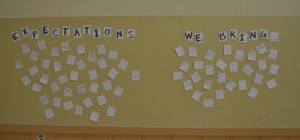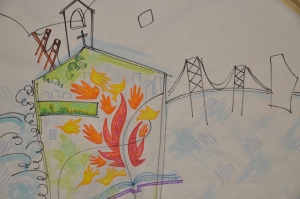Originally posted on Still Waters on July 21, 2011 . . .
Below is what came out of the Urban Legacy Convocation, a gathering of twenty-two San Francisco Presbyterian churches. Out of in-depth conversations, the document and painting encompasses the legacy that we want to live into. “What comes next” will be the next important step which will begin to focus how we can partner to make this legacy a realization. What became clear out of this gathering is that we need to spend more intentional time getting to know each other and need to develop real partnerships for effective ministry.

Drawing by Abigail King Kaiser
Introduction
In November 2010, a group of San Francisco Presbyterian pastors met to address the challenges that Presbyterian churches are facing living in the city. The initial group consisted of InHo Kim (Committee on Ministry co-chair), Cal Chinn (Transitional Executive Presbyter), John Anderson, Theresa Cho, Maggi Henderson, Harry Chuck, Kwang Sun Kim, Jim Kitchens, and Keenan Kelsey. Out of the conversations came an idea to gather the twenty-two Presbyterian churches to give needed attention to the needs, challenges, and potential of our congregations. There was also recognition that even though we live in a seven mile by seven mile city area, we do not know each other as well as we should.
The twenty-two San Francisco Presbyterian churches span the spectrum of diversity:
- 1 Mandarin
- 1 Cantonese
- 1 Japanese-American
- 1 Taiwanese-American
- 1 Indonesian
- 3 Korean-American
- 2 African-American
- 1 Latino-American
- 6 Multi-cultural
- 1 over 500 members
- 12 under 100 members
- 8 have no pastor or currently have interims
On June 18, 2011, each Presbyterian church in San Francisco was invited to send two representatives: either two elders or an elder and a pastor. The theme of the gathering was “Urban Ministry: What will be our legacy?” We tackled the questions: What will our legacy be 25 years from now? How do we, together, create a lasting presence in the city? What will be the result of our witness? Centered in worship and using the conversation model of World Café (worldcafe.com), participants spent time getting to know one another and engaged in conversation around topics, such as context of ministry, challenges, leadership, and our collective future legacy.
What We Bring
As participants of this gathering,
as residents of San Francisco,
as servants of our particular congregation, and
as followers of Jesus Christ called to this particular time and place,
we brought . . .
- more than 25, 30, 50 years of church experience
- an open heart and mind
- readiness for something new
- a strong belief in the power of partnership
- an eagerness to connect and be heard
- a willingness to learn from others
- a desire to keep church alive, making it sing and shout
- a hope for the future
- experience in working through transitions
- humor
- vision
- a heart for youth and mission
- persistence
- amazement
- concerns
- encouragement
- anticipation
- hope
- love and knowledge for PCUSA
- questions
- an open spirit for change
- optimism for things to come that are good
- sense of humor for things to come that aren’t as good
- experience in organizational development
- myself
What We Expect
As participants of this gathering,
as residents of San Francisco,
as servants of our particular congregation, and
as followers of Jesus Christ called to this particular time and place,
we expected . . .
- acknowledgement of everyone’s gifts and assets
- to learn about other churches
- to make mission connections
- surprise and excitement for future
- to identify goals and develop a follow-up plan
- to feel a sense of community
- answers, direction, and renewal
- to discover if we are still a connectional church
- guidance
- to get a fresh perspective
- to get to know each other and how we can work together
- to dream a collective mission for youth, homelessness, immigration, race relations
- to get a spark of a vision about the unique PCUSA mission in San Francisco
- engagement
- partnerships and clarity on how we can partner
San Francisco: Our Urban Context
San Francisco,
aka City by the Bay,
Frisco,
Fog City,
San Fran,
Golden Gate City,
46.7 square miles of rolling hills and beautiful views of the bay and Pacific Ocean,
a city that holds Chinatown, Japantown, North Beach, Castro, Little Russia, Little Siagon, Mission Delores, Tenderloin, and Haight Ashbury,
where on the same day, the sun shines on the Financial District and the fog hovers over Ocean Beach,
where the population of dogs outnumber the kids and Sundays are no longer Sabbath, but filled with birthday parties, marathons, festivals, sports, and rallies,
where coffee shops are not only for coffee lovers, but filled with those searching for free wifi and conversation,
where parking spaces and affordable housing are at a premium,
where people are more nature-lovers and spiritual than church attenders or faith seekers.
Urban Ministry: Our Unique Challenges
The many things that we love about our city are some of the very things that bring unique challenges to doing ministry in the city. The cultural shifts in the neighborhood, the change in need of those in our community, the competing activities pulling on people’s time, and the increasing cost of living make it challenging for congregations to stay relevant, connected, and in touch with their community.
The diminishing size of congregations adds to the stress as churches struggle to find ways to attract, sustain, and nurture different kinds of people to worship. San Francisco is filled with people in transition that move in and out of the city like a revolving door, either because of cost of living, new jobs, public school choice, or raising a family. Smaller congregations also struggle to maintain the church building; therefore becoming too dependent on rental income or unable to put resources towards ministry due to building maintenance. Church buildings have moved from being worshipful spaces, community centers, and places of ministry to a source of burden, an albatross, or physical hindrance to do ministry. And let’s not get started about the lack of parking. For ethnic congregations, there are not only challenges of how to reach out, but also how to preserve and honor their particular culture.
Challenges do not only stem from the outside, but from within as well. Questions that need to be asked are: Is there a willingness to try new things and change? Is there room to think creatively about worship? The city is changing fast, are we willing to adapt to be relevant? We say we want to welcome people, but opening our doors will change who we are, are we ready for that?
By focusing on our challenges, congregations can often feel lonely and isolated. However, we must not be discouraged because as Presbyterians we are a connectional church. We are not in ministry alone. Are there ways we can support each other by sharing resources, ideas, space, energy, prayers, and ministry?
Leadership We Need
These challenges mean we need effective leaders to help our congregations partner and explore creative ways to overcome these challenges. What characteristics are necessary for effective leaders for the church in today’s context and time?
Leaders who go deep…
plumbing the depths of faith in God and God’s people;
setting the church’s story and individual stories
within God’s story of grace, redemption, justice, and mercy
through Jesus Christ;
…and leaders who stretch wide:
reaching beyond comfort zones;
bumping into and embracing the complex and wondrous dimension of all of God’s people;
making space for the breath of diversity of God’s people in race, culture, class, age, theology, and context;
claiming in word and action that relationships are foundational to results.
Leaders who ask questions…
Why do we do what we do?
Where is God in our midst?
What’s out there?
Where are we going?
What will our legacy be?
What are we afraid of?
What do we dare dream?
…and leaders who live into answers:
letting ideas and vision ferment;
listening for what bubbles up;
trusting the wisdom of the community;
keeping an ear on the pulse of those in need;
staying open for creative inspiration.
Leaders who let go…
giving up the need to control;
sharing power;
risking failure;
checking ego.
…and leaders who take up:
moving beyond the idea of being open to that of actively pursuing openness;
starting with the gifts of the community rather than the needs of the institution;
going out into the world instead of waiting for the world to come in.
Leaders who lift up others…
encouraging and empowering;
mentoring and serving alongside;
equipping people to find the joy of their work in the world;
…and leaders who maintain selfawareness:
honing strengths and admitting weaknesses;
checking biases and norms;
nurturing a spiritual life that responds humbly, “Here am I.”
Leaders:
Servants, Teachers,
Networkers, Shepherds, Entrepreneur,
Mentors, Empowerers, Team Players,
Weavers of Visions, Community Organizers,
Evokers of Gifts, and Celebrants of Life’s Rituals
adapted from PCUSA Six Agency Leadership Consultation 2011
What Will be Our Legacy?
We are 22 Presbyterian churches serving a diverse, urban city.
Alone we struggle.
Alone we are limited.
We are 22 Presbyterian churches serving a population with needs.
Together we are a missional community.
Together we are partners in Christ’s service.
We are 22 Presbyterian churches with struggles and challenges.
Alone we are burdened by
lack of finances,
limited resources,
burden of building.
We are 22 Presbyterian churches with potential to make our dreams a reality.
Together our weaknesses are fulfilled with others strengths.
Together we are one church with 22 satellite locations.
Together our burdens (like building) can be another’s asset.
Together we can
feed the city, advocate for rights of immigrants,
partner with public schools, promote justice and peace,
collaborate in mission, and
create a sanctuary for our youth to experience
and grow in Christ.
 So, this is what we came up with as way to begin shifting our focus:
So, this is what we came up with as way to begin shifting our focus:





















